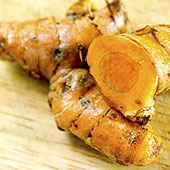|
Turmeric
 General Information Turmeric, a shrub related to ginger, is grown throughout India, other parts of Asia, and Africa. Known for its warm, bitter taste and golden color, turmeric is commonly used in fabric dyes and foods such as curry powders, mustards, and cheeses. It should not be confused with Javanese turmeric. Common Name(s) turmeric, turmeric root, Indian saffron Scientific Name(s) Curcuma longa How is Turmeric usually used? Turmeric's finger-like underground stems (rhizomes) are dried and taken by mouth as a powder or in capsules, teas, or liquid extractextractto get, separate, or isolate a desired active ingredients. Turmeric can also be made into a paste and used on the skin. What is Turmeric used for? In traditional Chinese medicine and Ayurvedic medicine, turmeric has been used to:
Turmeric has also been applied directly to relieve rash, pain, and inflammation, and help heal minor wounds (e.g., cuts and burns). Your health care provider may have recommended this product for other conditions. Contact a health care provider if you have questions. What else should I be aware of? There is some evidence that suggests turmeric may be effective in improving the symptoms of osteoarthritis, hyperlipidemia, and itching. However, there is not enough evidence to determine whether turmeric is useful in any of the other uses described above. Turmeric is considered safe for most adults. High doses or long-term use of turmeric may cause indigestion, reflux, vomiting, nausea, or diarrhea. Turmeric may interact with anticoagulants/antiplatelets, sulfasalazine, and drugs used to treat diabetes. If you have bile duct obstruction, gallbladder disease, a stomach ulcer, or acid reflux, or are pregnant, talk to your health care provider to confirm it is safe to use turmeric. Be careful about using turmeric if you have diabetes, a bleeding disorder, gastroesophageal reflux, or iron deficiency, are trying to conceive, or are a woman with a hormone-sensitive condition (e.g., breast cancer, uterine fibroids). Turmeric should be stopped at least 2 weeks before elective surgery. People whose symptoms persis or worsen should talk to their health care provider. Before taking any new medications, including natural health products, speak to your physician, pharmacist, or other health care provider. Tell your health care provider about any natural health products you may be taking. Source(s) National Center for Complementary and Alternative Medicine (NCCAM). Herbs at a Glance. Turmeric. http://nccam.nih.gov/health/turmeric/
Related conditions
Did you find what you were looking for on our website? Please let us know. |
|
|||||||||||||||||||||||||||||||||||||||||||||||||||||||||||||||||||||||||||||||||||||||||||||||||||||||||||||||||||||||||||||||||||||||||||||||||||||||||||||||||||||||||||||||||||||||||||||||||||||||||||||||||||||||||||||||||||||||||||||||||||||||||||||||||||||||||||||||||||||||||||||||||||||||||||||||||||||||||||||||||||||||||||||||||||||||||||||||||||||||||||||||||||||||||||||||||||||||||||||||||||||||||||||||||||||||||||||||||||||||||||||||||||||||||||||||||||||||||||||||||||||||||||||||||||||||||||||||||||||||||||||||||||||||||||||||||||||||||||||||||||||||||||||||||||||||||||||||||||||||||||||||||||||||||||||||||||||||||||||||||||||||
|
Hot Topics -
Bedwetting,
Depression,
Flu (Seasonal),
Healthy Skin,
Incontinence,
Multiple Sclerosis,
Psoriasis,
Stroke Risk Reduction
|
||
| Condition and disease information is written and reviewed by the MedBroadcast Clinical Team. |
||
|
|
The contents of this site are for informational purposes only and are meant to be discussed with your physician or other qualified health care professional before being acted on. Never disregard any advice given to you by your doctor or other qualified health care professional. Always seek the advice of a physician or other licensed health care professional regarding any questions you have about your medical condition(s) and treatment(s). This site is not a substitute for medical advice. © 1996 - 2024 MediResource Inc. - MediResource reaches millions of Canadians each year. |
|




